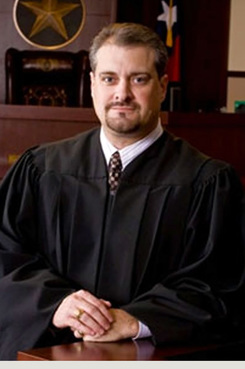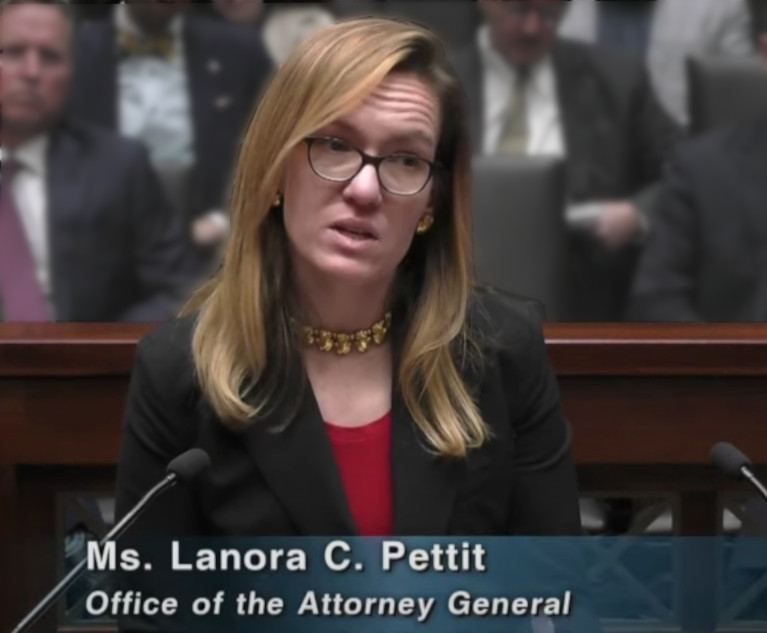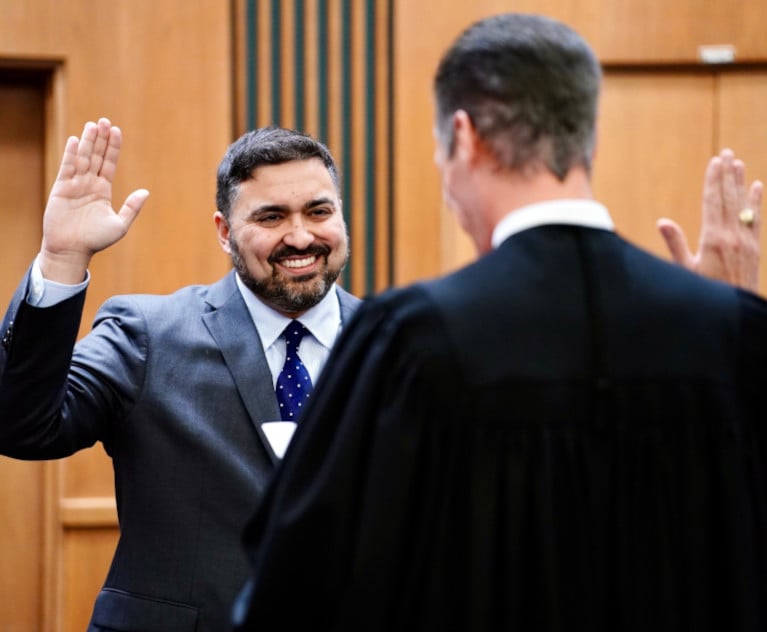In Rare Move, Texas Judge Appeals Judicial Misconduct Sanction
"I regret that I made mistakes in this case, but did so in a good faith effort to protect the interests of a vulnerable infant child," said 431st District Judge Jonathan Bailey.
August 07, 2019 at 12:57 PM
5 minute read
 Photo: Shutterstock
Photo: Shutterstock
A district judge in Denton County is appealing his public reprimand, which alleged he showed deep antagonism for a father in a state child custody case, and violated the father’s rights.
On Aug. 2,431st District Judge Jonathan Bailey requested that Texas Supreme Court Chief Justice Nathan Hecht appoint judges to a special court of review that will conduct a de novo trial into his judicial misconduct case.
“I allowed my concern for what I perceived to be in the child’s best interest to override my obligation to ensure that father received both due process and a fair trial,” Bailey wrote in a response he filed with the commission, which he emailed to Texas Lawyer.
The high court has 10 days to appoint three jurists to the special court, according to an email by Eric Vinson, executive director of the State Commission on Judicial Conduct. Once judges are appointed to the panel, the commission must file a charging instrument, he said.
“Even though it is the judge’s appeal, the burden of proof is on the commission,” he noted.
 431st District Judge Jonathan Bailey of Denton County
431st District Judge Jonathan Bailey of Denton CountyThe appeal concerns a July 16 public admonition, in which the commission condemned Bailey’s conduct in a parental rights termination case between a Texas agency and a father. The commission found Bailey violated judicial ethics rules, which require judges to recuse themselves when it’s appropriate, to be patient, dignified and courteous to those who appear before them in court, and to perform their duties without bias or prejudice.
“The judge failed to treat father with patience, dignity and courtesy by characterizing his trial testimony as ‘ridiculous’ and ‘crap’ and threatening him with prosecution for perjury,” the public admonition said.
The response that Bailey filed to the commission answered extensive questions about holdings by Fort Worth’s Second Court of Appeals, which overturned Bailey’s ruling in the underlying case and remanded the case to a new trial judge.
Bailey argued in the response that there were mischaracterizations or misquotes of some of his statements in the case regarding calling the father’s testimony “ridiculous” and “crap,” among other things.
“The trial transcript reflects that my use of those words was mischaracterized to the point of being misleading,” Bailey wrote in an email.
In one question, the commission asked Bailey why he accused the father of lying and threatened to have him prosecuted for perjury.
“Father provided sworn testimony that contradicted his prior sworn testimony,” Bailey replied. “In this instance, I believe that it was appropriate for me to point out to father that his testimony was demonstrably false, and that if he persisted, he could be prosecuted for perjury.”
Bailey wrote that he agreed with the appellate court’s conclusion that his impartiality was compromised, and he should have voluntarily recused himself. The court’s ruling humbled him, and he feels the way he handled the case was an anomaly compared to similar cases he’s handled as a judge.
“I recognize the mistakes that I made and will not repeat them,” Bailey wrote, noting that he’s attended a child welfare conference for judges to improve his judicial abilities in these cases.
It’s somewhat rare for judges to appeal judicial misconduct sanctions to a special court of review. The courts convene and hold a trial within the Texas Supreme Court’s chambers in Austin. They admit evidence from the commission and the appealing judge and hear witness testimony from both sides. Sometimes the commission files additional charges not included in the original sanction.
Bailey wrote in an email that the judicial conduct commission isn’t supposed to punish judges, but to uphold the honor and dignity of the judiciary. The commission can discipline judges for willful or persistent misconduct, he said. Bailey said that his public admonition exceeds the commission’s lawful purpose.
“In my ninth year on the bench, I have no history of misconduct resulting in public or private sanctions from the [State Commission on Judicial Conduct]. I have handled countless hundreds of other CPS cases without any history or pattern of similar error. I regret that I made mistakes in this case, but did so in a good faith effort to protect the interests of a vulnerable infant child,” he explained.
Read Bailey’s entire response:
Read about past judicial misconduct appeals:
Former Houston Judge Disciplined for Jailing Mentally Ill Rape Victim Before Trial
Special Court Issues Severe Sanction Against Former Judge Etta Mullin
Court: Judge Not Guilty of Ethics Violations for Facebook Posts
This content has been archived. It is available through our partners, LexisNexis® and Bloomberg Law.
To view this content, please continue to their sites.
Not a Lexis Subscriber?
Subscribe Now
Not a Bloomberg Law Subscriber?
Subscribe Now
NOT FOR REPRINT
© 2025 ALM Global, LLC, All Rights Reserved. Request academic re-use from www.copyright.com. All other uses, submit a request to [email protected]. For more information visit Asset & Logo Licensing.
You Might Like
View All


Trending Stories
- 1'Knowledge of Mismatch:' Fed Judge Offers Guidance on How to Hold Banks Accountable for Erroneous Transfers
- 2PAGA Claims Must Now Be 'Headed'
- 3Million-Dollar Verdict: Broward Jury Sides With Small Business
- 4'Reluctant to Trust'?: NY Courts Continue to Grapple With Complexities of Jury Diversity
- 5'Careless Execution' of Presidential Pardons Freed Convicted Sex Trafficker, US Judge Laments
Who Got The Work
J. Brugh Lower of Gibbons has entered an appearance for industrial equipment supplier Devco Corporation in a pending trademark infringement lawsuit. The suit, accusing the defendant of selling knock-off Graco products, was filed Dec. 18 in New Jersey District Court by Rivkin Radler on behalf of Graco Inc. and Graco Minnesota. The case, assigned to U.S. District Judge Zahid N. Quraishi, is 3:24-cv-11294, Graco Inc. et al v. Devco Corporation.
Who Got The Work
Rebecca Maller-Stein and Kent A. Yalowitz of Arnold & Porter Kaye Scholer have entered their appearances for Hanaco Venture Capital and its executives, Lior Prosor and David Frankel, in a pending securities lawsuit. The action, filed on Dec. 24 in New York Southern District Court by Zell, Aron & Co. on behalf of Goldeneye Advisors, accuses the defendants of negligently and fraudulently managing the plaintiff's $1 million investment. The case, assigned to U.S. District Judge Vernon S. Broderick, is 1:24-cv-09918, Goldeneye Advisors, LLC v. Hanaco Venture Capital, Ltd. et al.
Who Got The Work
Attorneys from A&O Shearman has stepped in as defense counsel for Toronto-Dominion Bank and other defendants in a pending securities class action. The suit, filed Dec. 11 in New York Southern District Court by Bleichmar Fonti & Auld, accuses the defendants of concealing the bank's 'pervasive' deficiencies in regards to its compliance with the Bank Secrecy Act and the quality of its anti-money laundering controls. The case, assigned to U.S. District Judge Arun Subramanian, is 1:24-cv-09445, Gonzalez v. The Toronto-Dominion Bank et al.
Who Got The Work
Crown Castle International, a Pennsylvania company providing shared communications infrastructure, has turned to Luke D. Wolf of Gordon Rees Scully Mansukhani to fend off a pending breach-of-contract lawsuit. The court action, filed Nov. 25 in Michigan Eastern District Court by Hooper Hathaway PC on behalf of The Town Residences LLC, accuses Crown Castle of failing to transfer approximately $30,000 in utility payments from T-Mobile in breach of a roof-top lease and assignment agreement. The case, assigned to U.S. District Judge Susan K. Declercq, is 2:24-cv-13131, The Town Residences LLC v. T-Mobile US, Inc. et al.
Who Got The Work
Wilfred P. Coronato and Daniel M. Schwartz of McCarter & English have stepped in as defense counsel to Electrolux Home Products Inc. in a pending product liability lawsuit. The court action, filed Nov. 26 in New York Eastern District Court by Poulos Lopiccolo PC and Nagel Rice LLP on behalf of David Stern, alleges that the defendant's refrigerators’ drawers and shelving repeatedly break and fall apart within months after purchase. The case, assigned to U.S. District Judge Joan M. Azrack, is 2:24-cv-08204, Stern v. Electrolux Home Products, Inc.
Featured Firms
Law Offices of Gary Martin Hays & Associates, P.C.
(470) 294-1674
Law Offices of Mark E. Salomone
(857) 444-6468
Smith & Hassler
(713) 739-1250







